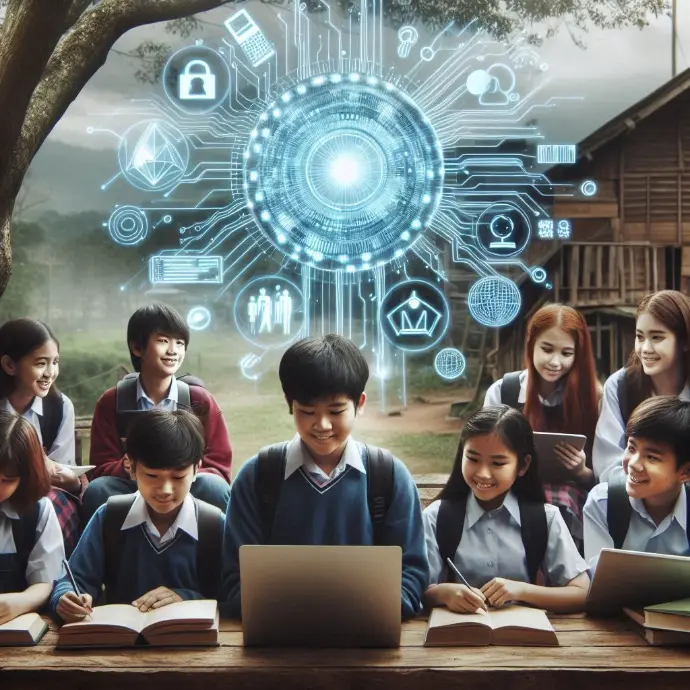The Internet of Things (IoT) and human rights are deeply connected, especially regarding digital access and its ethical implications. Here are some key points about this relationship:
- Digital access as a human right: Access to technology and connectivity is considered essential to guaranteeing rights such as education, health, and civic participation. However, the digital divide remains a challenge, limiting access for disadvantaged communities.
- Privacy and security: Digital interconnectedness poses significant privacy risks. The massive collection of personal data by IoT devices can violate fundamental rights if not properly regulated.
- Personal autonomy: The IoT can influence people's autonomy, especially when automated decisions affect their daily lives. This raises ethical questions about oversight and transparency.
- Digital inclusion: It is crucial to ensure that everyone, including marginalized groups, has equitable access to technology. This requires public policies that promote inclusion and reduce inequalities.
- Ethical regulation: Lack of adequate regulation can lead to the misuse of data and technologies. Ethical frameworks must be established to protect human rights while fostering innovation.
Introduction
Digital access has become a determining factor in the exercise and protection of human rights globally. The ability to access information, participate in public life, and use basic services through digital platforms has a significant impact in areas such as education, health, employment, and civic engagement.
The digital divide, which reflects disparities in access to technology and connectivity, can exacerbate existing inequalities and limit the full exercise of human rights for certain groups of the population. For example, those without internet access may face obstacles to exercising their right to education, as online learning has become increasingly common.
Furthermore, digital access plays a crucial role in protecting other fundamental rights, such as freedom of expression and access to information. The use of digital technologies for mass surveillance or online censorship poses significant challenges to privacy and freedom of expression in the digital environment.
The Internet of Things (IoT) refers to the interconnection of physical devices via the internet, enabling the collection and sharing of data. This network of devices ranges from household appliances to health monitoring systems, and its proliferation is transforming the way we interact with our environment.
In the context of human rights, the IoT poses unique challenges and opportunities. On the one hand, the massive collection of data through connected devices can provide valuable insights to address public health, security, and resource management issues. However, this data collection also raises concerns about privacy, information security, and the potential misuse of personal data.
Furthermore, the lack of effective regulation in the field of IoT can exacerbate disparities in access to technology, which in turn can affect the ability of certain groups to fully enjoy their human rights in an evolving digital environment.
Thorough exploration and in-depth analysis of the ethical implications of digital access and IoT in relation to human rights are essential to ensure that technological development does not undermine the fundamental principles of human dignity, equality, and justice. This ethical analysis must address issues such as equity in access to technology, protection of data privacy and security, and mitigation of potential negative impacts on human rights.
Furthermore, this thorough exploration and in-depth analysis requires the active participation of various actors, including governments, technology companies, civil society organizations, and affected communities. Collaboration among these actors is essential to developing regulatory frameworks and practices that promote equitable digital access and protect human rights in a constantly evolving digital environment.
Thorough exploration and in-depth analysis of the ethical implications of digital access and IoT are critical steps to ensure that technology benefits society as a whole and respects fundamental human rights in the digital age.
Digital Access and Human Rights
Digital access has become a fundamental human right in the modern era. Access to the internet and digital technology is crucial to ensuring participation in society, access to information, freedom of expression, and education. The UN Universal Declaration of Human Rights establishes that all human beings have the right to seek, receive, and impart information, and digital access is the tool that enables this right to be exercised in the digital age.
Digital access refers not only to the availability of technological infrastructure but also to the ability to use it effectively. This includes digital skills, computer literacy, and access to up-to-date devices and technologies. Without equitable digital access, many people find themselves marginalized and excluded from the opportunities offered by the digital world, which in turn widens the gap between those who have access and those who do not.
To guarantee digital access as a fundamental human right, governments, international organizations, and the private sector must work together to provide infrastructure, resources, and training programs that ensure that all people have the ability to use digital technologies effectively.
Limited digital access carries serious ethical implications in terms of equity, justice, and human rights. Those who lack digital access are prevented from fully participating in the digital society, which can exacerbate inequality and social exclusion. This can have a significant impact on areas such as job search, education, healthcare, civic participation, and the exercise of other fundamental rights.
Furthermore, limited access to digital technology can perpetuate a cycle of intergenerational inequality, as children without access to technology risk falling behind in terms of digital skills and educational opportunities. This can have long-term repercussions on their ability to compete in the labor market and fully participate in the society of the future.
From an ethical perspective, the lack of equitable digital access raises important questions about distributive justice and the collective responsibility to ensure that everyone has the opportunity to benefit from technological and digital advances.
The digital divide, defined as the division between those who have access to digital technology and those who do not, plays a crucial role in human rights violations. This gap can exacerbate existing disparities in the exercise of fundamental rights, such as access to information, freedom of expression, and participation in public life.
In the context of education, for example, lack of access to digital technology can limit access to online educational resources, putting students who lack the means to participate in online learning at a disadvantage. Likewise, in terms of civic participation, those who lack digital access may face obstacles to engaging in democratic processes and accessing information relevant to informed decision-making.
The digital divide can also contribute to the marginalization of certain groups in society, such as rural communities, people with disabilities, and minority groups, undermining their ability to fully exercise their human rights. Addressing the digital divide is therefore essential to ensuring equal opportunities and the protection of human rights for all.
Inclusive digital access is essential to ensure that all individuals, regardless of their geographic location, socioeconomic status, or physical abilities, have the opportunity to benefit from information and communication technologies. However, significant challenges hinder the achievement of this goal. One of the main challenges is the digital divide, which refers to the difference in access to technology among different population groups. This gap can manifest itself in the lack of connectivity infrastructure in rural or remote areas, the shortage of accessible devices for people with disabilities, or the lack of digital literacy in certain demographic groups.
To address these challenges and promote inclusive digital access, implementing effective solutions is essential. One of the key strategies is the expansion of connectivity infrastructure, including improving mobile network coverage and deploying broadband networks in underserved areas. Likewise, the provision of accessible devices and digital skills training are critical to closing the digital divide. Partnerships between governments, private companies, and nonprofit organizations can play a crucial role in implementing these solutions and promoting policies that foster equitable access to technology.
Furthermore, it is critical to consider the ethical implications of proposed solutions, ensuring that the expansion of digital access is carried out in a manner that is inclusive and respectful of human rights. By addressing the challenges of inclusive digital access with ethical solutions, significant progress can be made toward ensuring that all individuals have the opportunity to fully participate in the digital society and benefit from its many advantages.
The Internet of Things and its Impact
The Internet of Things (IoT) has transformed the way we interact with technology, directly impacting the protection of human rights globally. IoT applications in this context are diverse and span areas such as health, education, security, and mobility, among others.
In the health field, for example, the IoT has enabled the development of connected medical devices that can remotely monitor patients' health, providing access to medical care in remote or resource-limited areas. In education, the IoT has enabled the creation of more interactive and personalized learning environments, improving access to education through connected digital resources. In the context of security, the IoT has facilitated the implementation of surveillance and monitoring systems that contribute to the protection of the human rights to personal safety and integrity.
These IoT applications have the potential to expand digital access to essential services, which in turn can strengthen the protection of human rights in various areas, helping to reduce the digital divide and promoting social inclusion.
Digital interconnection driven by the IoT poses various ethical challenges in everyday life. One of the main challenges is the risk of discrimination and exclusion, as access to technology and the benefits it provides can vary significantly depending on socioeconomic, geographic, and cultural factors. This can accentuate the digital divide and deepen inequalities in the exercise of human rights.
Furthermore, the massive collection of personal data through IoT devices raises questions about privacy and informed consent. The lack of clear regulations surrounding the collection, storage, and use of this data can expose individuals to violations of their privacy and autonomy, which has direct implications for the exercise of their human rights.
Another important ethical challenge is cybersecurity. The interconnection of IoT devices increases the attack surface for potential security breaches, which can compromise the privacy and security of personal data, as well as impact people's physical and emotional integrity. These ethical challenges require in-depth reflection and the implementation of robust regulatory frameworks that guarantee the protection of human rights in an increasingly interconnected world.
Privacy and security in an interconnected world are fundamental aspects for the protection of human rights in the IoT era. The collection and processing of personal data must be framed by principles of transparency, informed consent, and specific purpose, ensuring that individuals have control over their information and that it is used ethically and responsibly.
Furthermore, cybersecurity takes on crucial relevance in an interconnected environment, where the vulnerability of IoT devices can pose a threat to the integrity and security of individuals. The implementation of robust security measures, data encryption, and effective vulnerability management are essential aspects for ensuring the protection of human rights in the context of the IoT.
Digital interconnection driven by the IoT presents both opportunities and challenges in the field of human rights. Ethical reflection and the adoption of effective regulatory measures are essential to ensure that digital access contributes to the promotion and protection of human rights globally.
Digital access plays a fundamental role in personal autonomy in the modern era. With the advancement of technology and the proliferation of internet-connected devices, people can access a wide range of information, services, and opportunities. From the ability to search for and access information relevant to decision-making to the ability to connect with global communities, digital access is essential to empowering individuals in making decisions that affect their lives.
In the context of human rights, digital access becomes a key enabler of personal autonomy. People can exercise their fundamental rights to freedom of expression, access to information, and participation in cultural and social life through digital platforms. Furthermore, access to online services such as education, healthcare, and civic participation directly contributes to people's ability to determine and control important aspects of their lives.
It is crucial to recognize that, as more aspects of everyday life become digitalized, digital access becomes critical to ensuring equal opportunities and non-discrimination. People who lack access to digital technology risk being excluded from important spheres of social, economic, and political life, undermining their personal autonomy and their ability to fully exercise their human rights.
In-depth Exploration and Analysis
In the context of human rights, digital access is a crucial issue that requires detailed and thorough analysis. To properly understand the ethical implications of digital access, it is essential to employ specific methodologies that allow us to assess the digital divide from a human rights perspective.
The methodologies used for analyzing the digital divide in the context of human rights must be comprehensive and multidisciplinary. This entails combining quantitative and qualitative approaches that consider not only technological infrastructure but also the socioeconomic and cultural barriers that limit equitable access to technology. The use of specific indicators, population surveys, and analysis of the geographic distribution of connectivity are some of the tools that can provide a more complete view of the digital divide and its impact on human rights.
Furthermore, it is essential to incorporate the active participation of affected communities, as well as human rights and technology experts, to ensure that the analysis is representative, ethical, and sensitive to local and global realities.
Studying specific cases is essential to understanding how digital access, or lack of access, directly impacts human rights. Cases such as limited access to health information in rural communities due to a lack of connectivity, or the digital exclusion of marginalized groups that limits their participation in democratic processes, are examples that clearly illustrate the complex interactions between digital access and human rights.
These case studies not only allow us to understand the specific problems arising from the digital divide, but also provide an opportunity to identify potential solutions and good practices that can be applied at the local, national, or global levels. By analyzing these cases, it is possible to highlight the urgency of addressing the digital divide as a human rights issue and promote concrete actions to guarantee equitable access to technology for the benefit of all of society.
Public policies play a crucial role in promoting digital access and bridging the digital divide from a human rights perspective. A critical analysis of these policies allows us to evaluate their effectiveness, identify potential biases or inequities, and propose recommendations for improvement.
It is essential to examine how internet access policies, investment in technological infrastructure, digital literacy programs, and other related initiatives impact different groups in society, especially those historically marginalized or vulnerable. This critical analysis should consider not only the technical and economic aspects, but also the ethical and human rights aspects involved in the formulation, implementation, and evaluation of these policies.
By constructively questioning existing public policies and proposing alternatives based on a human rights approach, it is possible to generate a positive impact on digital access and contribute to building more inclusive and equitable societies in the technological sphere.
Education plays a critical role in promoting inclusive digital access and bridging the digital divide. Digital literacy is essential for empowering people to make the most of information and communication technologies. Through educational programs that teach basic and advanced digital skills, individuals of all ages can be empowered to participate effectively in today's digital society.
Furthermore, digital literacy involves not only acquiring technical skills but also understanding the ethical, legal, and security aspects of technology use. Educational programs that foster awareness about online privacy, cybersecurity, and digital ethics are essential to ensuring that digital access occurs in a safe and responsible environment.
It is crucial that governments, educational institutions, and civil society organizations collaborate to develop and implement inclusive digital literacy programs that address the specific needs of different population groups, including marginalized and underserved communities. By doing so, significant progress can be made toward bridging the digital divide and promoting equitable access to the opportunities offered by the digital world.
Conclusions
Digital access has become essential for ensuring the full exercise of human rights in the modern era. As technology continues to advance, it is critical to work toward eliminating the digital divide and promoting equitable access to connectivity worldwide. The expansion of telecommunications infrastructure, affordable internet access, and digital literacy are key aspects of achieving this goal.
Furthermore, it is crucial to address the issue of ethics in the collection and use of data in the Internet of Things environment. Effective regulations and policies are necessary to protect people's privacy and security in an increasingly interconnected world. Developing strong ethical standards for data collection and use is essential to ensure that digital access does not compromise fundamental rights such as privacy.
The path to ethical global digital access involves not only expanding connectivity but also implementing strong regulations that protect human rights in the digital environment.
In the context of the Internet of Things, significant challenges arise for the protection of human rights. The increasing interconnectedness of devices and the massive collection of data pose ethical and legal dilemmas that require careful attention. The need to safeguard people's privacy, security, and autonomy in a constantly evolving digital environment is a crucial challenge for the protection of human rights.
Furthermore, the issue of equity in digital access remains a significant challenge, as significant disparities in connectivity exist across regions and communities. Addressing these inequities will require a comprehensive approach that combines investment in digital infrastructure, the promotion of digital literacy, and the implementation of policies that foster equitable access to technology.
In this regard, it is essential that governments, international organizations, and the private sector collaborate to define strategies and policies that protect human rights in the digital environment. International cooperation and commitment to sound ethical principles will be critical to addressing future challenges and ensuring that digital access is compatible with human rights around the world.

 IHRO NEWS
IHRO NEWS

